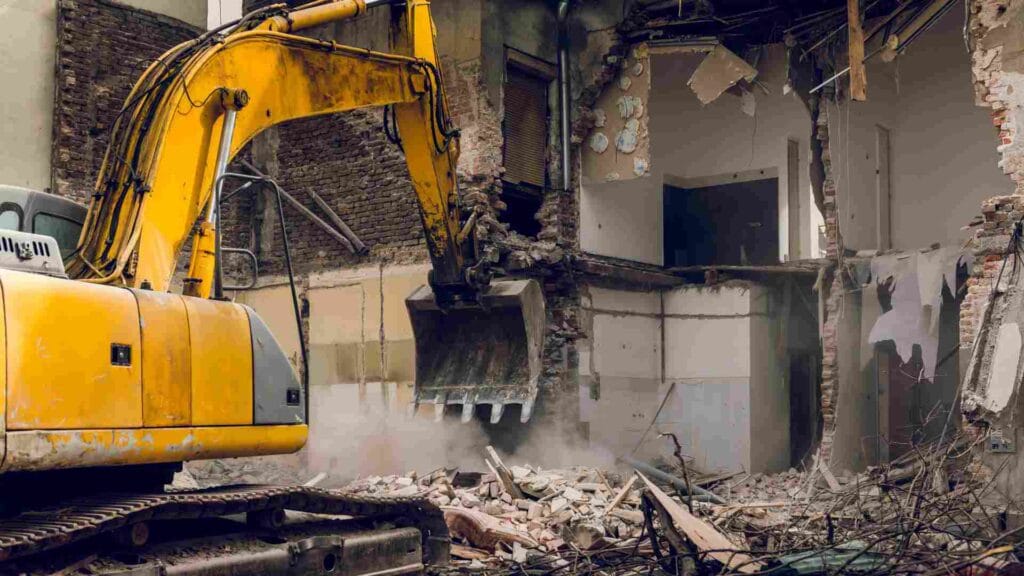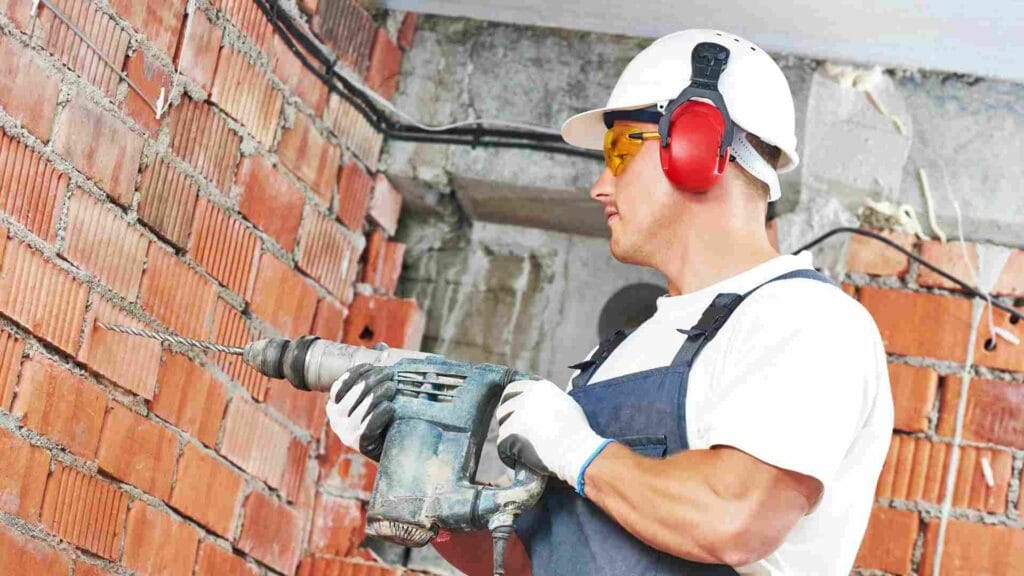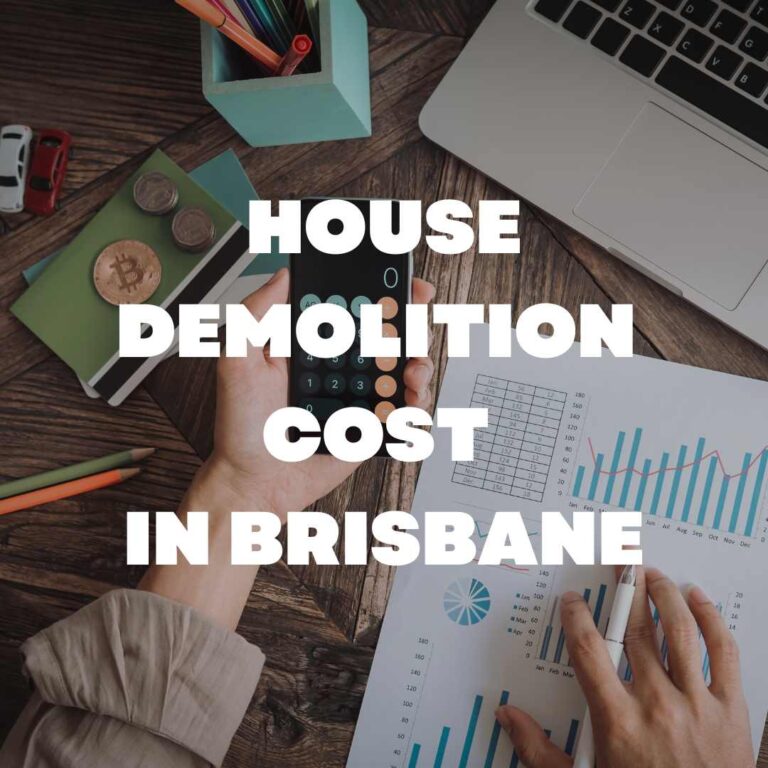To minimise noise and dust during demolition, follow Brisbane City Council’s noise restrictions, use quieter equipment, install dust control systems, and keep neighbours informed. Scheduling noisy tasks during approved hours and setting up barriers are also key strategies to avoid complaints and stay compliant with regulations.
At Pro House Demolitions Brisbane, we specialise in responsible, low-impact demolition services, ensuring a safer, quieter, and cleaner experience for you and your community. In this guide, we’ll explore effective tools, strategies, and communication practices to help you manage noise and dust efficiently on-site.

Table of Contents
ToggleThe Impact of Noise and Dust on Brisbane Neighbourhoods
Demolition activities produce audible noise and dust, which can become an environmental nuisance if not properly controlled. Noise from building equipment can disturb residents during the hours when people expect quiet, such as early mornings or weekends. Uncontrolled dust can also become air pollution, affecting residential areas and posing health risks.
Following noise restrictions and environmental guidelines from the council is not just important—it’s required. Proper management ensures your project remains compliant with Brisbane’s rules and keeps both your site team and the community happy.
Sources of Noise and Dust from Building Work
Noise from Demolition Activities
Heavy Machinery and Power Tools
Machines like excavators and jackhammers create loud audible noise during building work. Regular maintenance helps keep these tools quieter.
Generators and Engines
Generators are often left running for hours, especially on large sites. Placing them in acoustic enclosures helps reduce noise pollution and keeps operations within council limits.
Concrete Cutting, Grinding, and Drilling
Concrete cutting creates sharp, loud noises and dust. Using wet-cutting technology helps minimise both noise and air pollution.
Dust Sources During Demolition Work
Excavation and Earthworks
Digging foundations or removing soil generates large amounts of dust, especially on windy days. Using water misting systems helps reduce air pollution.
Handling Dry Materials
Moving materials like cement, gravel, and sand without sealed containers can send dust into nearby residential areas. Training workers on gentle handling techniques helps minimise dust.
Structure Demolition
Breaking down walls, cladding, and other building parts can generate hazardous dust. Fog cannons or misting systems are essential to control airborne particles.
Brisbane City Council’s Noise Restrictions for Building Work
Brisbane City Council regulates noise from building work to protect both the environment and residents. Following these noise restrictions is essential to avoid complaints.
- Allowed hours: Monday to Saturday, 6:30 AM to 6:30 PM.
- Noisy activities outside approved hours—such as Sundays and public holidays—are banned unless special permission is granted.
- If noise levels exceed normal thresholds, you may need to submit a work plan or apply for council approval.
Staying within these prescribed hours is important to maintain good relationships with residents and avoid fines.
How to Reduce Noise and Dust on Your Site
1. Set Up Noise Barriers and Use Quieter Equipment
- Use noise control barriers to block sound from engines and tools.
- Replace older machinery with low-noise equipment, and regularly service it to prevent loud mechanical noises.
2. Schedule Noisy Work for Approved Hours
- Plan noisy activities during daytime hours when residents are less likely to be disturbed. Avoid working outside normal time limits, such as early mornings or Sundays.
3. Apply Dust Suppression Technology
- Install misting systems to prevent dust from becoming airborne.
- Use hydromulch to cover exposed soil and reduce dust pollution.
4. Train Your Team on Noise and Dust Management
- Provide workers with noise-cancelling headphones to protect them from audible noise.
- Educate the team on using sealed containers and avoiding unnecessary engine idling.
Planning your project in the right suburb can make a big difference, especially when it comes to managing demolition impact on the surrounding area. Learn more about the best suburbs in Brisbane for knock down rebuild for neighborhoods that support redevelopment projects.

How to Manage Complaints from Residents
1. Notify Neighbours Before Work Starts
Send emails or leaflets to inform residents about the hours of operation, planned activities, and how to contact your team. Information like this helps build goodwill.
2. Set Up a Complaint Hotline
Provide a dedicated complaint channel via phone or email. Having a way for residents to submit complaints directly will help address issues before they escalate.
3. Appoint a Community Liaison Officer
Assign someone responsible for managing complaints and keeping neighbours updated about any changes to the work plan.
For families in the area, consider suggesting local diversions from our list of the best family-friendly activities in Brisbane to keep them entertained while work is underway.
Complying with Environmental Nuisance Requirements
Brisbane’s environmental nuisance laws require that builders and site managers keep noise and dust within acceptable limits. As the responsible officer, you must comply with these regulations:
- Submit plans to the council if activities may exceed noise restrictions.
- Ensure working hours follow prescribed guidelines from the Brisbane City Council.
- Take steps to control dust and air pollution during all phases of the project.
Failure to comply with these requirements may result in fines or stop-work orders.
Conclusion
Reducing noise pollution and dust is not just about meeting regulatory requirements—it’s about protecting the environment, respecting residents, and ensuring your project runs smoothly. By following Brisbane City Council’s noise restrictions and using smart technologies, you can manage complaints, meet environmental standards, and complete your project on time.
If you need help with house demolitions in Brisbane, Pro House Demolitions Brisbane offers expert services that prioritise noise control and dust management. Contact us today to ensure your project runs smoothly while staying compliant with all council regulations.
FAQs
What are Brisbane’s noise restrictions for building work?
Noise from building activities is allowed between 6:30 AM and 6:30 PM, Monday to Saturday, with no work permitted on Sundays or public holidays.
How can I manage dust pollution on-site?
Install misting systems, cover soil with hydro mulch, and train workers to handle dry materials carefully.
What should I do if residents submit a complaint?
Set up a complaint hotline and appoint a liaison officer to manage complaints promptly.
What equipment helps reduce noise?
Use acoustic barriers for generators and equip workers with noise-cancelling headphones to manage noise exposure.
Do I need a permit for demolition work in Brisbane?
Yes, Brisbane City Council requires a permit for most demolition projects, especially if the building is near residential areas, heritage-listed, or involves hazardous materials like asbestos. It’s important to check with the council and submit the necessary applications in advance to avoid fines and delays.




